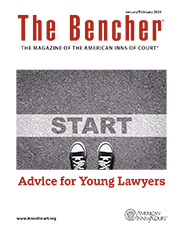Litigation Misconduct that Warrants Fee Shifting
The Bencher—January/February 2024
By Francis G.X. Pileggi, Esquire

 Prior ethics columns in this space over the years have addressed the standards that courts apply to determine whether litigation misconduct warrants fee shifting, even in the absence of an applicable statute or contract provision awarding fees to the prevailing party. A recent Delaware Court of Chancery decision is notable for its succinct description of specific examples of litigation conduct that warranted fee shifting in the context of a demand under Section 220 of the Delaware General Corporation Law, which allows stockholders, subject to satisfying certain prerequisites, to demand corporate books and records.
Prior ethics columns in this space over the years have addressed the standards that courts apply to determine whether litigation misconduct warrants fee shifting, even in the absence of an applicable statute or contract provision awarding fees to the prevailing party. A recent Delaware Court of Chancery decision is notable for its succinct description of specific examples of litigation conduct that warranted fee shifting in the context of a demand under Section 220 of the Delaware General Corporation Law, which allows stockholders, subject to satisfying certain prerequisites, to demand corporate books and records.
The featured decision involves a narrowly focused summary proceeding that is routinely expected, under court guidelines, to go to trial within 90 days of a complaint being filed. Some have observed anecdotally that fee shifting has become more common recently in Delaware than in the past 20 years or so, especially in Section 220 cases. See, e.g., Seidman v. Blue Foundry Bancorp., C.A. No. 2022-1155-MJZ (Del. Ch. July 7, 2023); Bruckel v. JAUC Holdings, LLC, C.A. No. 2021-0579-MJZ (Del. Ch. July 17, 2023).
Overview
Myers v. Academy Securities, Inc., C.A. No. 2023-0241-BWD, Order (Del. Ch. Oct. 2, 2023) features succinct but detailed examples of the type of conduct that Magistrate in Chancery Bonnie W. David determined to meet the “glaringly egregious” standard that a party must establish as an exception to the American Rule that each party is generally expected to pay its own attorneys’ fees regardless of the outcome of the litigation. Prior Delaware decisions have recognized that in extraordinary circumstances, “overly aggressive litigation strategies” employed to improperly resist a books and records demand may warrant fee shifting. See Pettry v. Gilead Scis., Inc., 2020 WL 6870461, at *30 (Del. Ch. Nov. 24, 2020).
The court explained that the earlier post-trial decision in this case, which set forth detailed factual findings and legal analyses, also explained that fee shifting might be appropriate and allowed the plaintiff leave to move for costs and attorneys’ fees. The instant ruling was completed within two weeks of the motion papers being submitted. The court found the following glaringly egregious conduct to support the shifting of attorneys’ fees under the circumstances of the case:
(1) As described in the court’s decision, the company involved changed its strategies in response to the complaint, which demonstrated that rather than considering the complaint in good faith, the company “desperately searched for reason after reason to deny plaintiff’s statutory rights.” Order at 4. When the plaintiff requested information from the company, it purported to cancel his shares, claiming that he had breached his fiduciary duties as minority stockholder, for which there is little legal support, and the terms of a separation agreement with the company. The company opposed the normal expedited scheduling provided in a summary proceeding, but when asked to brief a motion to dismiss on an expedited basis, the company elected not to do so.
(2) The company abandoned its initial arguments for rejecting the corporate books and records sought in the pre-suit demand. The company discarded its initial arguments for rejecting the demand, acknowledging (as it unsurprisingly conceded) that the plaintiff as a minority stockholder never owed fiduciary duties to the company and also dropped its argument that the separation agreement “released” plaintiff’s shares or rights under Section 220. The company then shifted its strategy by claiming that it had cancelled plaintiff’s shares for failure to pay a “subscription receivable” encumbering the shares. But the alleged subscription receivable was not memorialized in writing, as required by Delaware law, and the only “evidence” purportedly supporting this argument concerned a former employee from whom the plaintiff purchased its shares, who rejected the company’s attempt to assert the existence of an unwritten subscription receivable without his knowledge or consent. The court further explained that “without factual or legal support, [the company] used the subscription receivable as a post hoc litigation tactic to justify its cancellation of plaintiff’s shares in violation of statutory procedures governing the assessment and collection of unpaid subscriptions for stock.” The court reasoned that the company “should not have forced the parties to litigate a baseless standing defense through trial (citing Martin v. Med-Dev Corp., 2015 WL 6472597, at *21) (Del. Ch. Oct. 27, 2015) (explaining that a party’s “dogged pursuit of…borderline frivolous or near frivolous [issues] meets th[e] standard [for bad faith] because it utterly lacked any legal or factual bases.”)
(3) The court explained that during the litigation the company also raised other baseless factual assertions and legal red herrings. The court provided another example where the company argued that the plaintiff presented no evidence of an ongoing effort to sell his shares, even though the company purported to cancel them. The court also recounted how the company “focused significant time on an irrelevant argument that plaintiff technically violated regulatory requirements…which seemed intended more…to harass or embarrass and to undermine plaintiff’s entitlement to books and records.” The court explained that individually the arguments would not justify fee shifting, but in the aggregate, they reflect “an unfortunate pattern of unreasonable positions designed to unnecessarily complicate the proceedings.” See Auriga Cap. Corp. v. Gatz Props., 40 A.3d 839, 881 (Del. Ch. 2012) (shifting fees where “rather than focus on only bona fide arguments, defendant and his counsel simply splattered the record with a series of legally and factually implausible assertions in the strategy to exhaust the plaintiffs,” aff’d sub nom. Gatz Props., LLC v. Auriga Cap. Corp., 59 A.3d 1206 (Del. Ch. 2012).
Conclusion
This column can only touch the surface of a very fact-specific analysis. Although most clients want to be awarded fees, only after an analysis of the specific circumstances of a case, usually after trial, can a complete assessment be made to determine if the high bar of egregiousness has been met for fee shifting to be warranted.
Francis G.X. Pileggi, Esq., is the managing partner of the Delaware office of Lewis Brisbois Bisgaard & Smith, LLP. His email address is Francis.Pileggi@LewisBrisbois.com. He comments on key corporate and commercial decisions and legal ethics topics at www.DelawareLitigation.com.